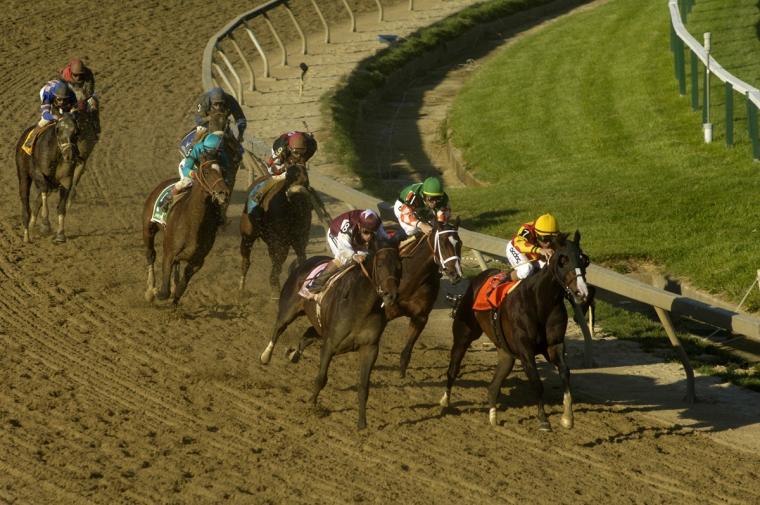
Recently, we heard the Belmont Stakes would be moving from their longtime home, Belmont Park, while renovations took place. Are the Preakness Stakes next? That’s a definite … maybe.
A new report released by the Maryland Thoroughbred Operating Authority suggests that the state should completely rebuild the facilities at Pimlico Race Course in Baltimore over the next three years. The state and Pimlico's current owner, the Stronach Group, reached an agreement in principle to turn the track over to the state to redevelop the area.
CBS News notes that the Authority is recommending rotating the racetrack which would allow for a new clubhouse, a parking garage, stables for 700 horses, an event space and a privately run hotel. (The report notes there have not been any major changes to Pimlico's clubhouse since it was built in 1960.)
The Baltimore Banner covered the news, noting that the plans, dubbed “Pimlico Plus,” also would be subject to approval by the Maryland General Assembly because they involve state money and a state-regulated industry. State lawmakers approved a plan for improving Laurel and Pimlico in 2020, but that work never got off the ground due to a mix of pandemic delays, inflation and tax implications.
Cost has long been a sticking point for the project, and the state has already authorized $375 million for improvements; the total cost of the plan is estimated at $400 million.
 The Authority is playing the long game with Pimlico, according to CBS: “Senior administration officials say this proposal would make Pimlico a "full-fledged, everyday racing facility" like fellow Triple Crown tracks Belmont and Churchill Downs, which would mean year-round economic activity, increasing Pimlico's live racing days to as many as 160 days per year. The track only had 23 live race days last year.”
The Authority is playing the long game with Pimlico, according to CBS: “Senior administration officials say this proposal would make Pimlico a "full-fledged, everyday racing facility" like fellow Triple Crown tracks Belmont and Churchill Downs, which would mean year-round economic activity, increasing Pimlico's live racing days to as many as 160 days per year. The track only had 23 live race days last year.”
The three-year redevelopment period would mean, in a hypothetical sense, at least, that the Preakness Stakes, the marquee event at Pimlico, would need to be relocated. According to suggestions made in the report, the Preakness would move to Laurel Park in Anne Arundel County, which hosts most of the state’s thoroughbred racing dates.
Specifics on the Laurel track can be found at this link. It is expected that the planning and design phase of the project would take at least a year, and that following construction, a new and modernized Pimlico would reopen in 2027. Architectural plans would take a year or more to come together, and the project would be completed by 2027; 2025 and 2026 are the expected years the Preakness would be held at Laurel.
But should Pimlico host more live racing throughout the year, Laurel stands to suffer tremendously. Laurel currently offers simulcast racing on weekdays and live racing on the weekends. If Pimlico undergoes all planned renovations, it would emerge as the premier facility for horse racing in Maryland. Laurel, according to its most recent feasibility report, operated with a loss from operations of $5.78 million in 2016 and $10.1 million in 2019.
Not only is Laurel in need of its own renovations but there is the question of how many tracks are needed in a relatively small state like Maryland.
“I don't think it should come as a surprise to anyone that operating two racing facilities 20 miles apart from one another is not conducive to profitability or, for that matter, sustainability under the current circumstances,” Alan Rifin, attorney for The Stronach Group, told the Thoroughbred Daily News. “That is why we continue to raise the question of industry-wide restructuring in an effort to right size the number of facilities and right size the number of racing days in order to best ensure a viable, sustainable and profitable racing industry for years to come.”
In 2019 (the most current year data was compiled), the Preakness Stakes were estimates to have an economic impact of nearly $53 million.

